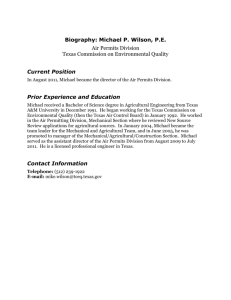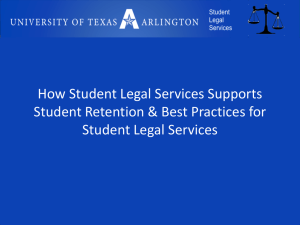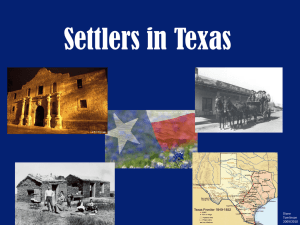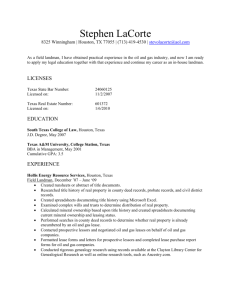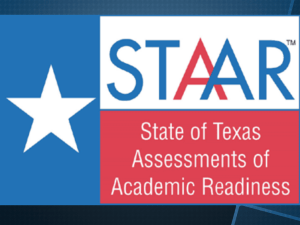House Economic & small business Development Committee
advertisement
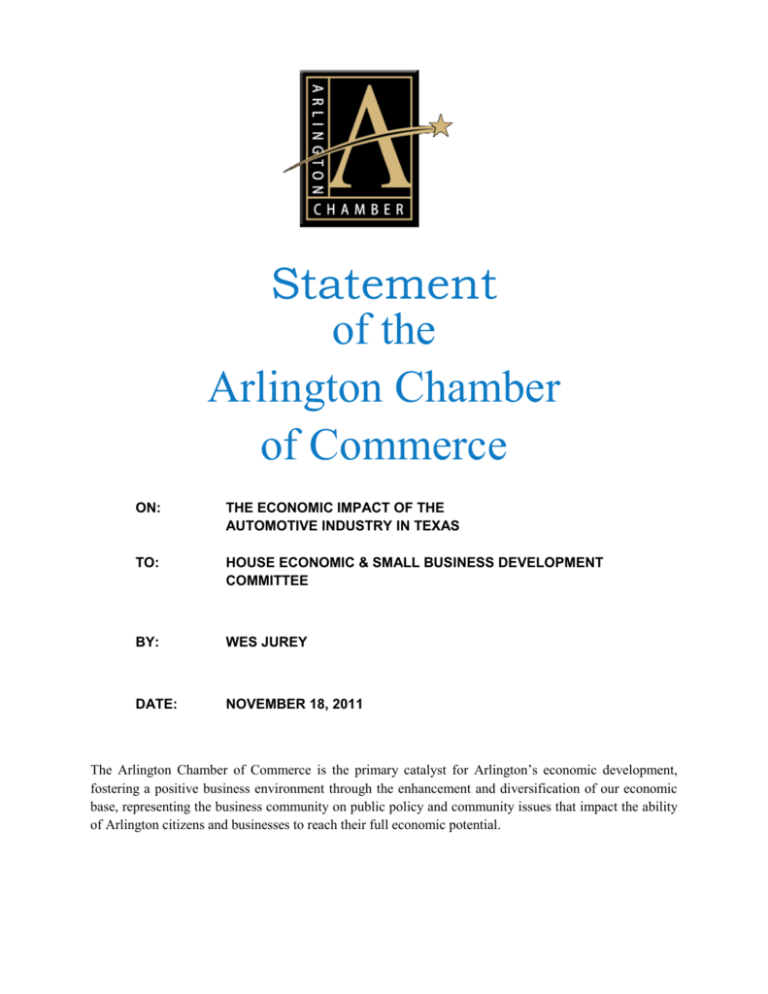
Statement of the Arlington Chamber of Commerce ON: THE ECONOMIC IMPACT OF THE AUTOMOTIVE INDUSTRY IN TEXAS TO: HOUSE ECONOMIC & SMALL BUSINESS DEVELOPMENT COMMITTEE BY: WES JUREY DATE: NOVEMBER 18, 2011 The Arlington Chamber of Commerce is the primary catalyst for Arlington’s economic development, fostering a positive business environment through the enhancement and diversification of our economic base, representing the business community on public policy and community issues that impact the ability of Arlington citizens and businesses to reach their full economic potential. The Arlington Chamber of Commerce The Arlington Chamber of Commerce is one of North Texas’ largest business federations, representing more than 1,400 businesses and organizations of every size, sector, and region; collectively they employ over 60,0000 individuals; one–third of Arlington’s total workforce. More than 96 percent of the Chamber's members are small businesses with 100 or fewer employees, 70 percent of which have 10 or fewer employees. Yet, virtually all of Arlington’s largest companies are also active members. We are particularly cognizant of the problems of smaller businesses, as well as issues facing the business community at large. Besides representing a cross-section of the Arlington business community in terms of number of employees, the Chamber represents a wide management spectrum by type of business and location. Each major classification of American business -- manufacturing, retailing, services, construction, wholesaling, and finance – is represented. Also, the Chamber has substantial membership throughout North Texas. The Chamber's state and national engagement is substantial as well. The Chamber has been and continues to be a participant in a number of state and national pilot projects and initiatives, focused on the Innovation Economy and developing and maintaining a competitive workforce. Our positions on state and national issues are developed by a cross-section of Chamber members serving on committees, subcommittees, and task forces. More than 300 business people participate in this process. Wes Jurey, President & CEO President & CEO of the Arlington Chamber of Commerce since 2001, Jurey also serves as Immediate Past Chair of the U.S. Chamber’s Institute for a Competitive Workforce; Chairman of the Texas Workforce Investment Council; and is a member of the U.S. Department of Labor’s Advisory Committee on Apprenticeship. He was one of nine individuals appointed to the U.S. Department of Labor committee charged with developing DOL’s five year research plan from 2002-2007. He founded the Center for Workforce Training & Preparation in El Paso, Texas; was a partner in the establishment of the Center for Continuing Education & Workforce Development in Arlington, Texas, and is the founder of the Center for Innovation in Arlington. In 2010, he established TechComm, a federal partnership intermediary, which currently represents 7 federal agencies, developing a multi-agency approach to federal technology transfer. 1 Testimony of Wes Jurey President and CEO of the Arlington, Texas Chamber of Commerce Before the House Committee on Economic and Small Business Development November 18, 2011 10:00 am “The Economic Impact of the Automotive Industry in Texas” 2 Good morning, Chairman Davis and members of the committee. I appreciate the committee’s invitation to discuss one of the most vital industries in our region, the automotive industry, which also represents a critical component of Texas advanced manufacturing cluster. That industry is vital to Arlington and north Texas, as we work to build a sustainable, diverse economic base for the future of our region and state. The General Motors assembly plant has been in Arlington since 1954. It is part of our identity. The 3.85 million square foot plant employs approximately 2,500 salaried and hourly employees, with annual wages exceeding $200 million. In 2010, GM paid more than $6 million in property taxes to our city, county, school and community college districts. In addition, our local governments estimate another $650 million is invested in suppliers to the GM facility in Tarrant County alone, accounting for 400 to 500 additional jobs. The advanced manufacturing sector generates wealth, one of three things that actually happens in an economy. Manufacturing generates wealth through the value added process of creating a product; we work to recirculate that wealth within our region and state by developing the supplier and service providers needed to support primary manufacturers; otherwise, we see the wealth generated more rapidly migrate to other economic regions. So we care about what happens to this plant. I am not going to throw a lot of numbers at you, though bear with me if I repeat a few that you might also hear from some other witnesses. I expect some of the others who have, or will, testify will cover some of these numbers from different perspectives. And some of what I am going to talk about really applies to advanced manufacturing in Texas as a whole. While vehicles are a particular type of manufactured product, other capital-intensive industries with high wages also benefit from some of the same tax structures and incentive programs as the auto industry; from that same perspective, the lack of supportive tax structure and incentives can challenge the manufacturing sector’s ability to remain competitive in today’s global economy. The most important thing to say is that in many ways, Texas already gets it right. Texas is a lowtax, low regulation state. A lot of the things we hear from locations around the country with other plants just aren’t on the table here. We have our challenges with federal air quality laws, though it’s my understanding that the Arlington GM plant has managed its emissions in a responsible way and is not an issue in the ozone compliance problem we find ourselves wrestling with in North Texas. At several points in the past 20 years, the Arlington plant has faced competition within General Motors for new product lines. Our local governments have always responded positively, by working with the plant’s leadership to create an incentive package that would, along with the company and the union’s own efforts, keep the plant competitive. 3 Since 1990, according to city and county records, local governments have entered into seven tax abatement agreements with the General Motors facility. I think that alone shows the commitment our region has to this industry. In the early ‘90s, these agreements tended to abate 100 percent of the new capital investment at the plant. In recent years, the city and county have entered into agreements at the 70 and 80 percent levels. These agreements have required the plant to maintain minimum employment numbers equal to their employee base at the time of the agreement. During the last 20 years, this support has incented GM to invest almost $1 billion in the Arlington assembly plant, on everything from retooling the production line to a new paint facility to expansion of the plant footprint. At critical intervals, these investments and the participation of local governments have literally been the deciding factor in attracting new product lines and maintaining employment in north Texas. I would add that the state’s overall favorable business climate – the low taxes and reasonable regulatory atmosphere that has prevailed – has also contributed to keeping the industry alive in Texas. The preservation of the state’s economic development programs that make those incentives possible is critical to maintaining Texas competitiveness. While many communities have shifted away from reinvestment zones tied to tax abatement as a useful tool in recent years, maintaining this option, which is found in Chapter 312 of the state tax code, is vital for circumstances that require significant capital expenditures, such as retooling or expanding a manufacturing plant such as the General Motors facility has done in Arlington. In general, we would urge the committee to maintain all of the incentives in the tax code. These include: The opportunity for local governments to abate taxes in specific circumstances. The opportunity for local governments to create Tax Increment Finance Districts, where public infrastructure that supports new development is paid for by taxes from the value increases created by new development. The Chapter 313 incentives that allow governments, particularly school districts, to participate in the construction of very large industrial projects, such as the Toyota plant in San Antonio. I am aware that some aspects of the Chapter 313 program are controversial, and that it is set to expire at the end of 2014. Before allowing that to happen, I would urge the Legislature to set the controversy aside long enough evaluate the program based on the results it has achieved, and its potential to incent future growth. This program, which allows school districts to participate in incentives for very large projects that might otherwise not locate in Texas, is critical to future industrial development in the state. That development will create additional high paying jobs; jobs that could employ some of the same taxpayers who criticize the program. Given our unemployment rate, that is important. I also 4 recognize there are challenges in making the program more transparent from a state perspective, and that there are legitimate questions about some of the qualifying projects, in terms of how many jobs they create and the value of those jobs. There seems to be a split in the questions about the law between its application for smaller projects, such as wind farms, for instance, and larger, manufacturing plants that produce many more than the minimum number of jobs. Those issues, however, can be addressed without eliminating the program. Given the nature of school financing in Texas today, I would not suggest anything that would further take revenue away from school districts. That makes the preservation of the state’s participation in the offsetting school districts’ revenue loss from these incentives vital in future endeavors. From a “bottom line” perspective, it seems prudent for the state to invest in the growth of its tax base through the creation of jobs in an industry sector that generates wealth. I just mentioned school districts, and while their issues don’t fall under the jurisdiction of this committee, if we’re talking about supporting the auto and other manufacturing industries, the success of our public schools in producing graduates with language and math skills, who can engage in critical thinking and work in groups, can’t be overstated. Ensuring that manufactures have access to a well educated workforce with the skills and training necessary to manufacturing is as critical as a public policy environment that supports, rather than inhibits, the health of the industry. The Chamber fully supports the accountability measures the state has passed that should give us a higher-skilled set of graduates. And, while we know money alone isn’t the answer to all the issues in our school districts, another round of cuts in state assistance to our public schools would not send a positive signal to industry looking for a competitive workforce in Texas. Similarly, we would hope that legislators would recognize how important the state’s infrastructure is to automobile manufacturers and other industries doing business in Texas. Economic sustainability depends on our ability to move people, products and information, in a rapid and effective manner, in the marketplace. The growth Texas has and continues to experience has also resulted in our roads becoming more congested all the time, threatening the ability of companies to make on-time deliveries and get their goods to market. We are also experiencing a drought as bad as anything many of us have seen in our lifetimes. A dependable water supply and a dependable transportation system are vital to anyone doing business in the state. On both of those fronts, the needs are well documented. The projected shortfalls have been widely discussed around the capitol. We need to formulate answers to make sure future transportation and water supply requirements can be met. I recognize those issues do not come to this committee, but both are critical to manufacturing, or really, economic activity of any kind. As a clear and specific example, Fort Bliss went through two rounds of BRAC hearings in the ‘90’s. We discovered that the greatest threat to the future growth of Fort Bliss was the perception by the Department of Defense that the west Texas region would experience a water shortage within 50 years. The community, working collaboratively, developed a state of the art 5 desalination capability, which played a role in convincing the Department of Defense that water would be available. Today, Fort Bliss is experiencing significant growth, representing economic opportunities for west Texas, all due to a focus on water infrastructure. The interim charge for this hearing also included reviewing opportunities available to partner manufacturers’ research and development with Texas colleges and universities, including technology enhancements in safety or alternative fuel systems. Technology innovation is something the auto industry and advanced manufacturing is constantly seeking. Many plants, including the GM facility in Arlington, employ robotics to do many of the jobs. In terms of the Arlington GM plant, they have worked with both UT Arlington’s Automation & Robotics Research Institute, as well as NASA to develop and improve their robotic technology. That prompts me to suggest an additional way for Texas to think about and support innovation: by accessing patented technology from the federal government. In 2009, the Arlington Chamber was asked by the U.S. Department of Defense to serve as a federal partner intermediary, known as TechComm, to develop a new interagency model to enable the transfer of federal lab discovered patented technologies to the marketplace for use by industries and entrepreneurs, large and small. TechComm’s premise is that the future economic sustainability of the US is dependent upon the ability to foster collaboration among and between the nation’s federal labs, research universities, venture capitalists, and industry. TechComm views the intellectual capital (IC) of the labs as still untapped and very valuable. TechComm has two primary goals in working with federal labs: (1) foster and support collaboration for lab patent prosecution, licensing and research priorities of the lab and (2) develop network of the just-mentioned entities to foster commercialization of lab technologies. TechComm is also unique, in that it also serves as a national partner intermediary to five additional federal agencies: the US Departments of Agriculture and Homeland Security, the National Institutes of Health, the National Institute of Standards and Technology, and the National Oceanic and Atmospheric Administration. Agreements with the US Department of Energy and NASA are pending; discussions are underway with the US Department of Transportation. MOU’s are also under development with the U.S. Treasury, the SBA, and the Department of Labor. What that means for Texas is that the Center for Innovation, under government contract, has access to the resources of 300 federal labs, that spend over $100 billion annually on research, 6 employing over 100,000 scientists and researchers, with over 30,000 patents available for commercial use and production. The Center has direct access to the patent databases of these labs, enabling the Center to assist businesses and industries to license federal patents for their commercial use, manufacture and production. It means the Center can work to develop cooperative research agreements among and between GM, Toyota and our state’s universities with the federal labs that are doing research relevant to enhancements in safety or alternative fuel systems. As one example, the Center is currently working with a consortium of partners to finalize testing on two technologies that could enable the construction of biofuel refineries in Texas, converting industrial waste or invasive plant species to biofuel that could be refined at a cost competitive with petroleum. Doing so in Texas would lessen our dependence on foreign oil, create jobs, generate wealth, and expand our tax base. I recognize that may seem far afield from traditional discussions of state economic development programs. However, we are already working with the Governor’s Office and the Emerging Technology Fund to engage them with TechComm. Although its premise is not focused on any particular industry, the concept of economic development by combining intellectual property with capital and manufacturing know-how is a fundamental way to increase the state’s industrial base, without necessarily putting hard-to-come-by tax dollars into every project. I want to again thank the committee for the invitation and its interest in the auto industry and in continuing to promote industrial growth in Texas. Thank you for what you do, and I would be pleased to answer any questions you might have. 7




